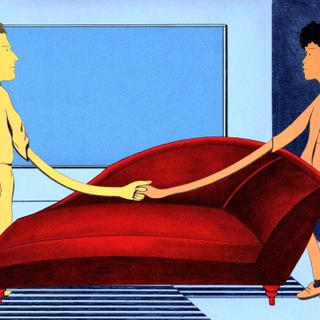


''Have you ever seen a shrink?' I always ask on the first date': When mental health enters the dating scene
InvestigationSeducing by highlighting your 'personality type,' talking about your shrink, expecting your suitors to be aware of their 'traumas': The vocabulary of psychology has crept into our romantic lives. And dating apps are capitalizing on the trend.
"Hey guys, I'm begging you, go and get some therapy!" Milisa Ben Ahmed Aly implores in one of her latest videos, aimed at her 1,200 TikTok subscribers. Then she adds, pointing her finger at the camera, "I'm talking to you: the guys who create traumas for chicks because you don't want to deal with your own traumas." In the 1960s, couples therapy was developed to help spouses communicate better. In the 2020s, some expect their partner to have started therapy... even before the relationship begins. "I ask the question on the first date: 'Have you ever seen a shrink?' It gives me a good idea of who I'm dealing with, whether it's someone capable of confronting themselves," said the 27-year-old from Lyon.
The question has taken on added importance since she began her own therapy in 2021: "I can see that I'm better at managing my emotions and problems with those close to me. As a result, I tell myself that the person in front of me will be better able to manage the relationship with me if they've done this work too," said Ben Ahmed Aly. By favoring partners who are open to the idea of seeing a shrink, she hopes to stop being seen as an "emotional garbage can": "I remember an ex who had a lot on his mind. We often talked about it, but he didn't offer me the same. I would have preferred him to pay someone to talk about his traumas," she explained.
Juliette (first name changed), a 32-year-old Parisian dancer and choreographer, has outright made this a "selection criterion." After experiencing several "manipulative and demeaning" partners, she decided five years ago to only date men who had already seen a shrink. "It allows them to look at their feelings, to take the pressure off their shoulders. Consulting a third party makes you less selfish, more aware of the harm you can do to others," she said.
Seductive argument
According to the testimonies gathered for this article, these expectations emerge mainly from heterosexual women. For some, the aim would be, in particular, to free themselves from the burden that the mental health of a partner resistant to psychological support can represent. According to a survey published in 2018 in the journal Social Psychiatry and Psychiatric Epidemiology, men suffering from mental disorders seek care half as much as women. In 2022, according to a study conducted by Doctolib, women still accounted for 78 % of patients for psychological consultations, based on appointments made on the platform.
Cécilia Commo, psychologist and author of the book Le couple parfait n'existe pas ("The Perfect Couple Does Not Exist"), has heard the subject come up several times from the mouths of some of her patients. "People who have done their own work, and for whom it has been good, don't want to be with people who are at ground zero," confirmed the psychologist, who was nevertheless keen to point out the limits of this method: "You don't come out of therapy having become benevolent, kind and empathetic. People come to see a therapist to feel better, which doesn't mean they'll feel better as a couple, or become the ideal partner. In fact, some patients tell me they ghost [suddenly break off all contact without explanation] or cheat on their partners."
You have 55.99% of this article left to read. The rest is for subscribers only.
